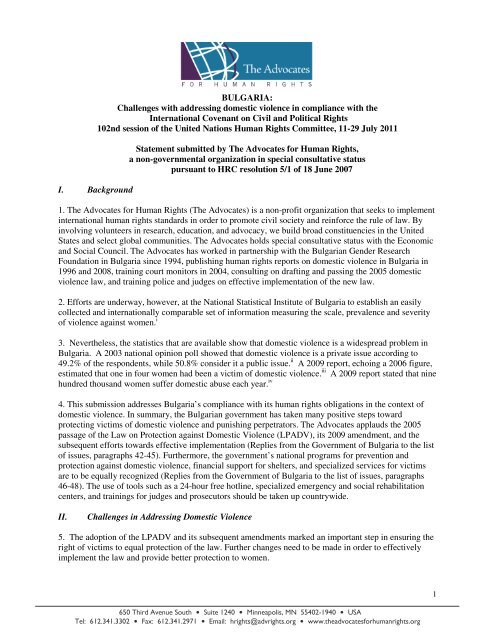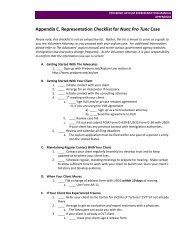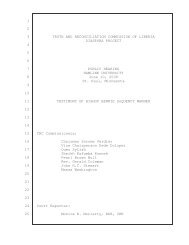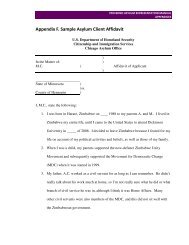BULGARIA - The Advocates for Human Rights
BULGARIA - The Advocates for Human Rights
BULGARIA - The Advocates for Human Rights
You also want an ePaper? Increase the reach of your titles
YUMPU automatically turns print PDFs into web optimized ePapers that Google loves.
<strong>BULGARIA</strong>:Challenges with addressing domestic violence in compliance with theInternational Covenant on Civil and Political <strong>Rights</strong>102nd session of the United Nations <strong>Human</strong> <strong>Rights</strong> Committee, 11-29 July 2011I. BackgroundStatement submitted by <strong>The</strong> <strong>Advocates</strong> <strong>for</strong> <strong>Human</strong> <strong>Rights</strong>,a non-governmental organization in special consultative statuspursuant to HRC resolution 5/1 of 18 June 20071. <strong>The</strong> <strong>Advocates</strong> <strong>for</strong> <strong>Human</strong> <strong>Rights</strong> (<strong>The</strong> <strong>Advocates</strong>) is a non-profit organization that seeks to implementinternational human rights standards in order to promote civil society and rein<strong>for</strong>ce the rule of law. Byinvolving volunteers in research, education, and advocacy, we build broad constituencies in the UnitedStates and select global communities. <strong>The</strong> <strong>Advocates</strong> holds special consultative status with the Economicand Social Council. <strong>The</strong> <strong>Advocates</strong> has worked in partnership with the Bulgarian Gender ResearchFoundation in Bulgaria since 1994, publishing human rights reports on domestic violence in Bulgaria in1996 and 2008, training court monitors in 2004, consulting on drafting and passing the 2005 domesticviolence law, and training police and judges on effective implementation of the new law.2. Ef<strong>for</strong>ts are underway, however, at the National Statistical Institute of Bulgaria to establish an easilycollected and internationally comparable set of in<strong>for</strong>mation measuring the scale, prevalence and severityof violence against women. i3. Nevertheless, the statistics that are available show that domestic violence is a widespread problem inBulgaria. A 2003 national opinion poll showed that domestic violence is a private issue according to49.2% of the respondents, while 50.8% consider it a public issue. ii A 2009 report, echoing a 2006 figure,estimated that one in four women had been a victim of domestic violence. iii A 2009 report stated that ninehundred thousand women suffer domestic abuse each year. iv4. This submission addresses Bulgaria’s compliance with its human rights obligations in the context ofdomestic violence. In summary, the Bulgarian government has taken many positive steps towardprotecting victims of domestic violence and punishing perpetrators. <strong>The</strong> <strong>Advocates</strong> applauds the 2005passage of the Law on Protection against Domestic Violence (LPADV), its 2009 amendment, and thesubsequent ef<strong>for</strong>ts towards effective implementation (Replies from the Government of Bulgaria to the listof issues, paragraphs 42-45). Furthermore, the government’s national programs <strong>for</strong> prevention andprotection against domestic violence, financial support <strong>for</strong> shelters, and specialized services <strong>for</strong> victimsare to be equally recognized (Replies from the Government of Bulgaria to the list of issues, paragraphs46-48). <strong>The</strong> use of tools such as a 24-hour free hotline, specialized emergency and social rehabilitationcenters, and trainings <strong>for</strong> judges and prosecutors should be taken up countrywide.II.Challenges in Addressing Domestic Violence5. <strong>The</strong> adoption of the LPADV and its subsequent amendments marked an important step in ensuring theright of victims to equal protection of the law. Further changes need to be made in order to effectivelyimplement the law and provide better protection to women.650 Third Avenue South • Suite 1240 • Minneapolis, MN 55402-1940 • USATel: 612.341.3302 • Fax: 612.341.2971 • Email: hrights@advrights.org • www.theadvocates<strong>for</strong>humanrights.org1
6. Regular Trainings <strong>for</strong> Legal System Actors: Regular trainings of legal system actors—includingpolice, judges, prosecutors and social services—is necessary to ensure effective implementation of theLPADV and protection of domestic violence victims. NGO trainings of police, as well as collaborationswith and initiatives by the Ministry of the Interior, have facilitated a positive police response in protectingvictims. While judicial implementation has revealed both positive and negative practices, new judicialrotations onto the bench indicate that trainings <strong>for</strong> new judges must be continued on a regular basis.7. Directorate <strong>for</strong> Social Assistance: <strong>The</strong> Directorate <strong>for</strong> Social Assistance’s use of the LPADV toprotect victims and remove perpetrators from the home has been lacking; instead, the directorate relies onthe Child Protection Act to protect children. Also, directorate’s history of removing children from a nonviolentvictim indicates a strong need <strong>for</strong> training on domestic violence.8. Funding: <strong>The</strong> Bulgarian Government must make a real commitment to funding the NGOs andadvocates that conduct the monitoring and training on domestic violence. An annual line item allocationis commendable, but the funds disbursed must be of a realistic amount that will sustain their importantwork against domestic violence.9. Prosecution of Batterers <strong>for</strong> Trivial and Middle-Level Injuries: Challenges still remain in ensuringeffective protection against domestic violence and holding perpetrators accountable. Prime among these isthe need <strong>for</strong> amendments to the Bulgarian Criminal Code to ensure perpetrators are punished <strong>for</strong> acts ofdomestic violence. Provisions in the Criminal Code hinder victims of domestic violence from obtainingjustice. Article 161(1) of the Criminal Code requires that where the victims of domestic violence suffers atrivial or middle-level injury inflicted upon them by a spouse, brother or sister, or another relative, thepenal prosecution must be instituted on the basis of a complaint by the victim:(1) For trivial bodily injury under Article 130 and 131, paragraph (1), sub-paragraphs 3 -5, <strong>for</strong> trivial and medium bodily injury under Article 132, <strong>for</strong> the crimes under Article144, paragraph (1), Articles 145, 146 - 148a, as well as <strong>for</strong> bodily injury under Articles129, 132, 133 and 134, inflicted on a relative of ascending and descending line, a spouse,brother or sister, the penal prosecution shall be instituted on the basis of complaint by thevictim. v10. Thus, where a victim of domestic violence has suffered a trivial-level injury, she must file acomplaint and proceed through the criminal justice system alone. Also, victims who sustainmedium-level injuries from a relative must proceed through the criminal justice system withoutthe help of a prosecutor. vi <strong>The</strong>se victims may prosecute their cases on their own, but must locateand call their own witnesses and present their own evidence in court. Without a state prosecutorto institute penal prosecution, one attorney stated that a perpetrator of such an injury, knowingthat he is subject only to a private prosecution, could easily influence a victim not to prosecute,given their close relationship and the power and control over victims exercised by theperpetrator. vii11. While the LPADV provides an important civil remedy, it offers no criminal prosecutionexcept where the offender violates the order <strong>for</strong> protection. In this case, the offender would bepublicly prosecuted <strong>for</strong> obstructing a judgment, not <strong>for</strong> the infliction of injuries. viii Article 161(1)of the Criminal Code denies victims of domestic violence equal and effective access to thecriminal justice system, equal protection be<strong>for</strong>e the law, and does not provide an effective remedy<strong>for</strong> harm they have suffered. Responsibility <strong>for</strong> prosecuting violence against women should liewith prosecution authorities and not with victims, regardless of the level or type of injury.Without providing <strong>for</strong> state-initiated prosecution, Bulgaria’s current criminal law will not allow itto fulfill its international obligations.12. Prosecutorial Implementation: Although the criminalization of a violation of an order <strong>for</strong>protection brings an important change to the laws, prosecutors still remain uncertain as to their2650 Third Avenue South • Suite 1240 • Minneapolis, MN 55402-1940 • USATel: 612.341.3302 • Fax: 612.341.2971 • Email: hrights@advrights.org • www.theadvocates<strong>for</strong>humanrights.org
ole in these cases. <strong>The</strong> reticence to prosecute such violations that preceded the amendments stillcontinues post-amendments, thus demonstrating an ongoing need <strong>for</strong> trainings of prosecutors ondomestic violence and the LPADV.III.Violations of the International Covenant on Civil and Political <strong>Rights</strong>13. Domestic violence violates a woman’s rights to life, freedom from torture, equality be<strong>for</strong>e the courts,equal protection be<strong>for</strong>e the law, equality with men be<strong>for</strong>e the law and protection of the family, amongothers. <strong>The</strong> following articles of the International Covenant on Civil and Political <strong>Rights</strong> articulate astate’s duty to protect these fundamental human rights that are commonly violated in domestic violencecases.14. Right to life and security of person (Article 6): <strong>The</strong> right to life is shared by both men and women.However, violence directed against women by their intimate partners (current or <strong>for</strong>mer spouses,boyfriends, dating partners) is an epidemic that has devastating and unequal physical, emotional, financialand social effects on women and children.15. Prohibition of torture or cruel, inhumane or degrading treatment or punishment (Article 7)<strong>The</strong> Committee against Torture acknowledged that domestic violence may constitute torture or illtreatmentunder CAT as well as violate the right not to be subjected to torture or ill-treatment underArticle 7 of the ICCPR.16. Administration of Justice (Article 14): When a state fails to ensure that its criminal and civil lawsadequately protect women and consistently hold abusers accountable, or that its agents—such as policeand prosecutors—implement the laws that protect victims of domestic violence, that state has not actedwith due diligence to prevent, investigate and punish violations of women's rights.17. Protection of the family, the right to marriage and equality of the spouses (Article 23): Generalcomment 19 of the ICCPR protects the family and equality of the spouses. Both general recommendation18 and 19 ensure equality of rights and responsibilities of spouses as to marriage, during marriage and atits dissolution.18. Equality be<strong>for</strong>e the law (Article 26)States are required under international law to provide all citizens with equal protection of the law. If astate fails to provide individuals who are harmed by an intimate partner with the same protections itprovides to those harmed by strangers, it has failed to live up to this obligation. For example, when judgesimpose higher sentences on those who assault strangers than those who assault their intimate partners,battered women have been denied equal protection.IV.RECOMMENDATIONS19. Bulgaria’s future path must see it further re<strong>for</strong>m the laws to support the fight against domesticviolence perpetrators, continue trainings of the legal sector and public awareness campaigns, ensureadequate funding and implement the necessary programs in order to create zero tolerance towarddomestic violence. <strong>The</strong> <strong>Advocates</strong> makes the following recommendations:A. Amendments to domestic legislation:• Amend the criminal laws to allow state prosecution in cases of low and medium-level assaultswhen the victim and perpetrator are related.• Promote policies that allow prosecutors to press charges against defendants without the consentor even involvement of the victim. Within any strategy, however, the three goals of prosecutionshould be: (1) to protect the victim, (2) to deter the defendant from further violent acts by holding650 Third Avenue South • Suite 1240 • Minneapolis, MN 55402-1940 • USATel: 612.341.3302 • Fax: 612.341.2971 • Email: hrights@advrights.org • www.theadvocates<strong>for</strong>humanrights.org3
him accountable <strong>for</strong> his actions, and (3) to communicate to the community that domestic violencewill not be tolerated.• Promote policies that recognize the importance of maintaining the custody of children with nonviolentparents. Support policies that allow and enable women to take their children with them toshelters.B. Justice and Legal Sectors• Ensure that the state adequately and consistently supports and funds NGOs to continuespecialized training on women’s human rights, domestic violence and implementation of theLPADV. Such trainings should be mandatory, regular and country-wide <strong>for</strong> police, prosecutors,judges, DSA and child protection authorities.• Continue working to increase the coordinated community response among NGOs, police, courts,the DSA, health care providers and the media.C. Funding• Continue to provide NGOs with sufficient and regular funding to realistically carry out their workon domestic violence and trainings.D. Public Education and Prevention• Support comprehensive prevention programs and educational programs in schools and othereducational institutions.V. Suggested Questions <strong>for</strong> the Committee to ask Bulgaria:• What measures have been taken to effectively investigate, prosecute, and sanction perpetrators ofdomestic violence?• How many cases of the civil courts have resulted in civil protection orders?• Are violations of orders <strong>for</strong> protection being prosecuted?• How many cases are there of repeat offenders?• Are prosecutors being encouraged to assist victims with their complaints to expedite the long andarduous process? Are prosecutors aware that they can begin such a procedure on behalf of thevictim themselves?• Now that the pilot training <strong>for</strong> magistrates has been completed will there be ef<strong>for</strong>ts to make thistraining mandatory <strong>for</strong> all judges and prosecutors?• Is the government disbursing all the funds promised to NGOs in the full amount and on time?APPENDIX: Implementation of the the Bulgarian Law on Protection against Domestic Violence: A<strong>Human</strong> <strong>Rights</strong> Report, <strong>The</strong> <strong>Advocates</strong> <strong>for</strong> <strong>Human</strong> <strong>Rights</strong> and the Bulgarian Gender Research Foundation(BGRF) (2008), available at http://www.advrights.org/sites/608a3887-dd53-4796-8904-997a0131ca54/uploads/FINAL_REPORT_2.pdf.i NATIONAL STATISTICAL INSTITUTE OF <strong>BULGARIA</strong>, INDICATORS TO MEASURE VIOLENCE AGAINST WOMEN, (2009).ii OPEN SOC’Y INST., FACT SHEET, VIOLENCE AGAINST WOMEN: DOES THE GOVERNMENT CARE IN <strong>BULGARIA</strong>? 2 (2006), available athttp://www.cwsp.bg/upload/docs/<strong>BULGARIA</strong>_VAW_FACT_SHEET_2006.pdf (last visited Apr. 1, 2010).iii U.S. DEP’T OF STATE, COUNTRY REPORTS ON HUMAN RIGHTS PRACTICES – <strong>BULGARIA</strong> (2007) [hereinafter DEP’T OF STATE HUMAN RIGHTSCOUNTRY REPORT], available at http://www.state.gov/g/drl/rls/hrrpt/2007/100552.htm (last visited Apr. 1, 2010); Every fourth woman inBulgaria is a victim of domestic violence – report, Sofia Echo, Mar. 6, 2010.iv Press Digest – Bulgaria, Reuters, Dec. 12, 2006.v Criminal Code, Art. 161(1)(Bulg.).vi For trivial bodily injury under Article 130 and 131, paragraph (1), sub-paragraphs 3 - 5, <strong>for</strong> trivial and medium bodily injury under Article 132,<strong>for</strong> the crimes under Article 144, paragraph (1), Articles 145, 146 - 148a, as well as <strong>for</strong> bodily injury under Articles 129, 132, 133 and 134,inflicted on a relative of ascending and descending line, a spouse, brother or sister, the penal prosecution shall be instituted on the basis ofcomplaint by the victim. Criminal Code, art. 161(1); see also: MINNESOTA ADVOCATES FOR HUMAN RIGHTS, DOMESTIC VIOLENCE IN <strong>BULGARIA</strong>10 (1996).vii ELLINGEN ET AL., supra note Error! Bookmark not defined., at 40.viii LPADV, art. 21(2); Criminal Code, art. 161(1).650 Third Avenue South • Suite 1240 • Minneapolis, MN 55402-1940 • USATel: 612.341.3302 • Fax: 612.341.2971 • Email: hrights@advrights.org • www.theadvocates<strong>for</strong>humanrights.org4
















